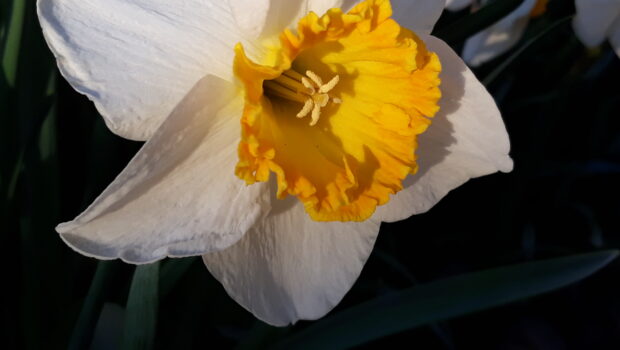Getting out of Egypt (or Getting the Egypt out of Us) in a Time of Coronavirus
We thought that “going viral” was a metaphor. Something that happens to memes or YouTube videos. Living in our safe, manufactured culture of entertainment and consumer products, we forgot that the term “going viral” came from epidemiology—the way that a virus can spread through a population. We forgot that going viral can also mean sickness and death, shutting down our human projects, our economy, our normal lives.
We forgot that we live in a world larger than us. We forgot that the world can be unpredictable and dangerous. We are all experiencing fear. And it feels like a different kind of fear than most of us are used to. The bottom has fallen out of our sense of security. We are exposed and vulnerable in a way that is hard to grasp yet is very real.
Now, right on time for Passover, a plague is upon us. But, that’s not how the story is supposed to go! We thought the plagues were for the Egyptians! Not us.
But, remember, the Israelites were not just living in Egypt. According to the commentaries, they were emmeshed in Egyptian culture. Egypt was our mother and we were a part of her. It took a miracle to get us out—and then, once we were out of Egypt, did we ever really succeed in getting the Egypt out of us?
What was the problem of Egypt according to the Biblical texts?
Looking ecologically, Egypt was a culture and economy based on the bounty that came to them every year from the Nile. They used technology of pumps and canals, and many slaves and serfs to reap this bounty. And they could always count on it like clockwork. They built pyramids and great store houses, mummies and monuments. This was an extension of their basic world view: their way of trying to defeat death, using technology to guarantee that they would never be vulnerable, always in control.
The Israelites were supposed to come to a different kind of land which would teach them different lessons. The Torah makes this ecological comparison between the land of Canaan and Egypt:
The land you are about to enter and possess is not like the land of Egypt from which you have come. There you sowed your seed and watered it with your foot, like a vegetable garden. But the land you are about to cross into and possess, a land of hills and valleys, soaks up its water from the rain of heaven. It is a land which YHWH your God watches over; God’s eyes are constantly upon it, from the beginning of the year to year’s end. [Deuteronomy 11: 10 – 12]
Israel’s ecology of hills and valleys watered by rain made it impossible to have that illusion of absolute control. “Watered with your foot” refers to the pumps and canals of Egypt—and also to the fact that they were looking down, not up to heaven. In this biblical picture of Egypt, people didn’t seek the relationship with God, the giver of rain, that the hilly country of Canaan would require.
But learning this lesson, that our real security comes from relationships: with the land, with our neighbors, with God, is not easy. In our modern society we have grown very good at the Egypt strategy. With our technology we have grown used to feeling invulnerable.
But, as much as in the biblical story of Egypt, this absolute control and power to be above vulnerability is an illusion. And now we are experiencing that illusion exposed. Our modern, material wealth, our technology and power has not kept us safe. We are exposed, vulnerable, living in fear.
What can we learn from this plague? If we are, in our minds and actions, still in Egypt, how do we get out? How do we get free?
We are learning what it means to be deeply connected. Even as we separate into our little shelter-in-place refuges, this invisible virus is showing us the deeply connected world that we inhabit, and the responsibility that our connectedness brings. We tend to forget that our small actions can have huge consequences. But now that every touch, every sneeze, every breath, could activate a chain of infection, a viral explosion of disease—we are all stretched to imagine those deep connections.
Perhaps we can also learn that our small actions do make a difference when we vote, when we sign a petition, when we make a phone call or even when we smile at someone. We can be spreading a viral cascade of kindness and caring, justice and peace with our small actions.
We are learning, like Pharaoh, that we are not gods, but are mortal, vulnerable creatures of the earth. Perhaps with this uncomfortable awareness of vulnerability we can start to learn that our Egypt-like strategy of creating an illusory consumer product filled bubble of clean, safe, abundance is just that: an illusion. Our pyramid-like bubble of comfort is actually dependent on cutting and burning our forests, poisoning our air, polluting our waters, sickening our brothers and sisters. And our illusion of god-like power is now coming back at us and killing us, not only with the Coronavirus, but with climate change induced storms, droughts, and fires, with epidemics of deaths of despair from addiction, obesity, and depression, and with political chaos.
We are learning that life is precious and fragile on this earth. And that life is sustained by a complex and delicate network of interconnected relationships which we must approach with humility and care. When we can learn that lesson, perhaps we will, this Pesach, start to get free of our Egypt and experience a taste of true freedom.







9 Responses to Getting out of Egypt (or Getting the Egypt out of Us) in a Time of Coronavirus